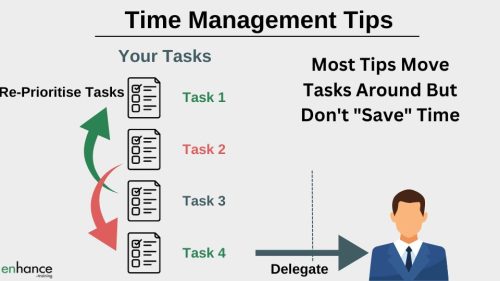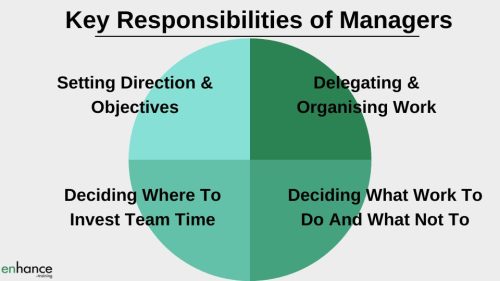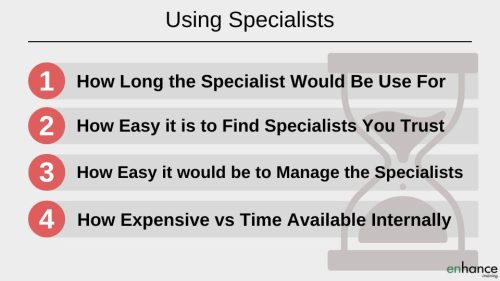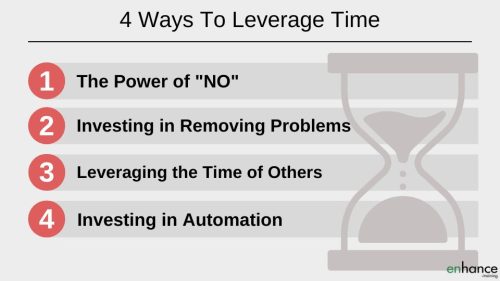4 Ways to Leverage Time as a Manager

4 ways to leverage time as a manager gives you more control, more mental space, more influence in your business and a path to achieving more – personally and for your team.
We all have the same number of hours and minutes in a day and we all want to create time as a manager.
Time management tips are usually about prioritising the more important or more urgent tasks and putting them at the top of your to do list, or they are about delegating to your team. These are all valid, yet they don’t save time overall. They just move the time around or to different people.
4 Ways to Leverage Time As A Manager
- The Power of No
- Investing in removing problems
- Leveraging The Time of Others
- Investing in Automation

What you do with the time you have and the impact you make is the difference between great and poor. How we manager time as a manager is what we can change, not time itself.
I am sure you have met them. The managers who always seems to be in control, are calm and have time and space to tackle those last minute problems. They seem to have teams that follow their behaviours. Wouldn’t you prefer to be one of these managers compared to the managers that rush around, bouncing from one challenge to the next, getting caught up in fire-fighting and always seem to be so time poor.
Watch on YouTube
Listen on Podcast
Leveraging time or saving time as a manager often means investing time now to save a lot more time into the future. The best managers know exactly how to leverage their time and the huge benefits they and their team get from doing so.
Investing in automation is a lot more than implementing IT systems – read to the bottom for examples that you can implement today.
The first critical way to leverage time as a manager is knowing the power of saying no
As an individual, and certainly as a team, you get so many requests to help with projects, to provide information and to help out. There are so many different reasons for these requests, some being:
- Asking you or your team is easier than doing the task themselves, or
- They want information, analysis or help that is useful not essential, or
- Being asked to meetings for information sharing purposes rather than to really contribute, or
- Being asked to join a project team, with only sporadic need for your expertise within the project, or
- Running projects that are not aligned with your team’s or the company’s goals
There are so many ways you can end up spending your time to help others, without making good use of your skills and expertise. Your team will be in exactly the same position, with lots of demands on their time that could be used in a better way.
Saying no is really powerful for you and your team
Saying no gives you time to dedicate to tasks, activities, problems, decisions and projects that matter more to achieving the results your team and company needs and wants.
What to say no to, for you and for your team, is very much a judgement call. Every time you or your team are asked to undertake work or use time, you should ask yourself:
- How well does this use of time achieve key goals or objectives for the team and company?
- How does this use of time compare to the other ways we could use our time? Are the benefits to the team and company higher or lower?
- How does the use of time today affect our future time needs? i.e. is it an investment of time today that reduces the time spent in the future.
Taking these steps gives you a list of tasks, activities, problems, decisions, and projects that represent the most valuable use of your time and your team’s. Everything else that remains below this capacity list if you like, you should say no to.
Most people understand this, yet many don’t follow this into the action of saying no. Saying no is hard because it involves disappointing or upsetting people to some extent. When saying no, always explain the reasons you are saying no and why other uses of time matter more.
Learn how to say no diplomatically and considerately. Saying no stops the use of time at another point or by another person. Practice using your judgement and your persuasion skills to say no more at work! You and your team will create more value by saying no.

Invest in removing problems – The second critical way to leverage time as a manager
There are lots of problems that your team encounters that reduce the time they have to do value-creating work. Spending an hour to save your team 10 hours of work is probably a very good use of your time. Think how productive your team could get if you found 10 problems like this to solve. Common problems include:
- Disruptive staff or those staff performing poorly,
- Processes that include steps that are outdated, irrelevant, poorly designed, no longer produce desired results, … in fact any process that uses up more time that is should or could or produces substandard outcomes
- Meetings with low value outcomes – the ones where you walk out not sure what the meeting achieved
- Lack of automation – i.e. the staff time used is a lot more costly than software doing the same task
- Projects that are started and not completed, acting as a time dust bin
- Constantly changing direction or priorities for the team – which wastes a lot of time on initiatives that are not continued
You the manager are usually best placed
to persuade, organise, get permission or budget, or take actions to get the problems fixed. Creating mental space, time, and permission for others to fix problems can be an amazing investment of your time.
Just think of the impact of freeing up 1 hour every week for every person in the team to spend getting the team closer to achieving their key objectives or goals. What if you could free up 2 hours, or 5 hours for each person each week.
Think how much more your team would achieve, how much faster they would reach team goals if they didn’t have to wade through a load of small to medium impact problems.
The best managers know how valuable spending their time is – to fix problems that impact multiple team members. This is how to create time as a manager for your team. Removing problems also has a big positive impact on team motivation as well at the team results.
Remove all the problems that you can for you team. Less problems is a great way to increase your time as a manager too.

Leveraging The Time of Others
As a manager, you have a huge influence on how your team members use their time. Managers typically:
- Set direction and objectives or goals – within the framework of the function and company goals
- Use delegation to give work to team members and develop their skills
- Decide what work to do and what work to say no to
- Decide where to invest time so they can save team time in the future – examples include resolving problems and automating tasks
All these 4 areas are huge on managing your time more effectively and that of your team. Use time well and beating expectations and goals will be a lot easier. Use too much team time on low value admin tasks and your team is likely to continually disappoint.
I have three different ways of increasing how well you leverage the time of others.
Firstly,
by increasing your skills as a manager
to direct and focus the work your team does. You are increasing the effectiveness of how well you can leverage the time of others. For example if you improved your approach of how you set direction with the team and getting their buy in, the team will be more motivated and have more ownership of their goals. The research shows this significantly increases the chances of goals being reached.
Secondly, you can
increase the skills of your team
in the areas needed to reach team goals in the short term and the longer term. For example, you manage the sales team and use phone calls to book in sales meetings with potential customers. Training your team on how they should run those sales calls to increase the number of sales meetings booked per 100 phone calls made would be a key way of leveraging your team’s time.
Thirdly,
increasing the use of specialists
to undertake specific tasks would be another way of leveraging team time. At a basic level, this might be asking Jane to do a certain task because she does it twice as quickly as Dave. You can take using specialists a lot further – by outsourcing part of what is needed to other teams within the company or to other companies. There are a lot of factors in using specialists including:
- How long the specialist would be used for. The longer the amount of time needed, the more sensible to use a specialist
- How easy it is to find specialists you trust if you are looking outside your team or company
- How easy it is to manage what the specialists delivers for you
- How expensive in monetary terms to use external specialists compared to the availability of time internally. For instance, if you have lots of spare team time available you can’t put to better use, paying for external specialist would not make sense even if they could do it twice as quickly
Spend time thinking about how you can leverage the time of others to make delivering against targets and expectations easier and quicker.

The fourth critical way to leverage time as a manager is Investing in Automation
When you find tasks and activities that are repetitive or are being duplicated, you should consider if there is an option to automate that task or activity or part of it.
This might be a simple as spotting that a team member is typing out the same information into two different excel spreadsheets when teaching them how to use the copy function or lookup functions would save them an hour each week.
Or slightly more complex – the same information is being entered into two different systems which can be linked via an API process with relatively little set up time. If the set-up time invested is paid back quickly by using the ongoing time saved for more value adding activities, then the investment is well worth it.
Use software to reduce the time taken by team members to complete tasks. Using mechanical or robotic automation is another form of leveraging team member time.
Automation can also mean using processes and checklists. These may not be full automation in the way using software is, but they do save thinking time and energy and can be used to give a more consistent output, regardless of which team member is using the process or checklist.
Invest in automation where there is a compelling business outcome from doing so. Think small as well as big. The smaller automations may not be game changers but when you have 100 of them, they really are game changing for your team.

In summary
A key part of being a manager is leveraging your time and that of your team. You are no longer contributing and delivering work directly but rather through your team and colleagues.
The best managers understand the importance of leveraging their teams time which is the best way to save time as a manager.
Key behaviours we have covered to save leverage time as a manager are:

I wish I had more time … I have thought that so many times as a manager. There are lots of time management techniques that are very useful and should absolutely be used. They don’t give you more time, just help you use time better.
The 4 ways to leverage time as a manager gives you concrete practical ways to really use your time to maximum effect – for yourself, for your team – to get the very best from the team you manage.






